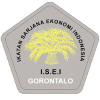Mendorong Gen Z : Digitalisasi Untuk Kemajuan UMKM
Abstract
This study aims to identify the various factors that influence Generation Z's participation in developing MSMEs in Kediri District through digitalization, as well as the challenges faced in implementing digitalization.This study uses a descriptive qualitative approach method to describe the role of Generation Z in the development of Micro, Small, and Medium Enterprises (MSMEs), especially in the Kediri region. Generation Z, which is known for its high technological adaptability, has great potential in driving the digitalization of MSMEs. The results show that the involvement of Generation Z in digital marketing strategies, the use of social media, and product innovation is crucial to improving the competitiveness of MSMEs. This research provides a clear picture of the need to empower Generation Z to contribute significantly to the advancement of MSMEs in Kediri, and provides recommendations for stakeholders to create an ecosystem that supports collaboration between the younger generation and MSME players.
Keywords
Full Text:
PDFReferences
Arifin, R., Ningsih, A. A. T., & Putri, A. K. (2021). The Important Role of MSMEs in Improving The Economy. South East Asia Journal of Contemporary Business, Economics and Law, 24(6), 52–59.
Bigliardi, B., Filippelli, S., Petroni, A., & Tagliente, L. (2022). The digitalization of supply chain: A review. Procedia Computer Science, 200(2019), 1806–1815. https://doi.org/10.1016/j.procs.2022.01.381
Cham, T. H., Cheah, J. H., Memon, M. A., Fam, K. S., & László, J. (2022). Digitalization and its impact on contemporary marketing strategies and practices. Journal of Marketing Analytics, 10(2), 103–105. https://doi.org/10.1057/s41270-022-00167-6
Chigbu, U. E., Atiku, S. O., & Du Plessis, C. C. (2023). The Science of Literature Reviews: Searching, Identifying, Selecting, and Synthesising. Publications, 11(1). https://doi.org/10.3390/publications11010002
Dariansyah, D. (2021). Penerapan Pajak Penghasilan (PPH) Final terhadap Usaha Mikro Kecil dan Menengah (UMKM) berdasarkan PP No 23 Tahun 2018 pada wilayah kerja Kantor Pelayanan Pajak Pratama Depok. Duconomics Sci-meet (Education & EconomicsScienceMeet),1(23),15–19. https://doi.org/10.37010/duconomics.v1.5347
De Boer, P., Bordoloi, P., Dallmann, J., & Hengshen, L. (2021). Generation Z work values: A cross-national analysis. Cross Cultural Business Conference, 1–10. https://www.researchgate.net/publication/352780767_Generation_Z_work_values_A_cross-national_analysis
Guo, H., Yang, Z., Huang, R., & Guo, A. (2020). The digitalization and public crisis responses of small and medium enterprises: Implications from a COVID-19 survey. FrontiersofBusinessResearchinChina, 14(1), 1–25. https://doi.org/10.1186/s11782-020-00087-1
Ho, T. C. F., Choo, L. S., Teo, P. C., & Kaliappen, N. (2020). Attracting Gen Z to Small and Medium Enterprises (SMEs):A View through the Job Characteristic Model. 2020 International Conference on Decision Aid Sciences and Application, DASA 2020, 142–145. https://doi.org/10.1109/DASA51403.2020.9317049
Magd, H., & Jonathan, H. (2022). Digitalization-An Emerging Business Trend for Sustainable Transformation of SMEs Sectors. An International Journal, 14(2s), 51–65.
Muafi, Sanusi, Z. M., & Roostika, R. (2023). Digital Skills, Digital Entrepreneurship, Job Satisfaction, and Sustainable Performance of MSMEs: A Survey on MSMEs in Indonesia. International Journal of Sustainable Development and Planning, 18(2), 465–473. https://doi.org/10.18280/ijsdp.180215
Mulyani*, Inayati, T., & Aryanto, R. (2019). Digital Generation: Entrepreneurial Motivation of Generation Z in digital Era. International Journal of Recent TechnologyandEngineering(IJRTE),8(4),5376–5380. https://doi.org/10.35940/ijrte.d7592.118419
Munsch, A. (2021). Millennial and generation Z digital marketing communication and advertising effectiveness: A qualitative exploration. Journal of Global Scholars of Marketing Science: Bridging Asia and the World, 31(1), 10–29. https://doi.org/10.1080/21639159.2020.1808812
Pohan, M., & Novien Rialdy. (2024). Analisis Faktor Yang Mempengaruhi Perilaku Gen Z Dalam Menentukan Bisnis Yang Diminati Sebagai Usaha Kecil. Jurnal Ilmiah Ekonomi Dan Manajemen, 2(6), 295–302. https://doi.org/10.61722/jiem.v2i6.1430
Ramdhani, A. T. A., & Madani, A. R. (2023). Aktivasi Gen-Z Terhadap Pengembangan UMKM Melalui Digitalisasi: Studi Kasus di Wilayah Kapanewon Moyudan. Aplikasia: Jurnal Aplikasi Ilmu-ilmu Agama, 23(2), 159–166.
Ritter, T., & Pedersen, C. L. (2020). Digitization capability and the digitalization of business models in business-to-business firms: Past, present, and future. Industrial MarketingManagement,86(December2019),180–190. https://doi.org/10.1016/j.indmarman.2019.11.019
Younas, A., Fàbregues, S., Durante, A., Escalante, E. L., Inayat, S., & Ali, P. (2023). Proposing the “MIRACLE” Narrative Framework for Providing Thick Description in Qualitative Research. International Journal of Qualitative Methods, 22, 1–13. https://doi.org/10.1177/16094069221147162
DOI: https://doi.org/10.37479/jeej.v7i3.27276
Refbacks
- There are currently no refbacks.
Copyright (c) 2025 Vebyana Desembrianti, Endah Kurniawati

This work is licensed under a Creative Commons Attribution-ShareAlike 4.0 International License.
Jambura Economic Education Journal has been indexed:
PUBLISHED BY :
Prodi Pendidikan Ekonomi Fakultas Ekonomi
Universitas Negeri Gorontalo, Indonesia


















